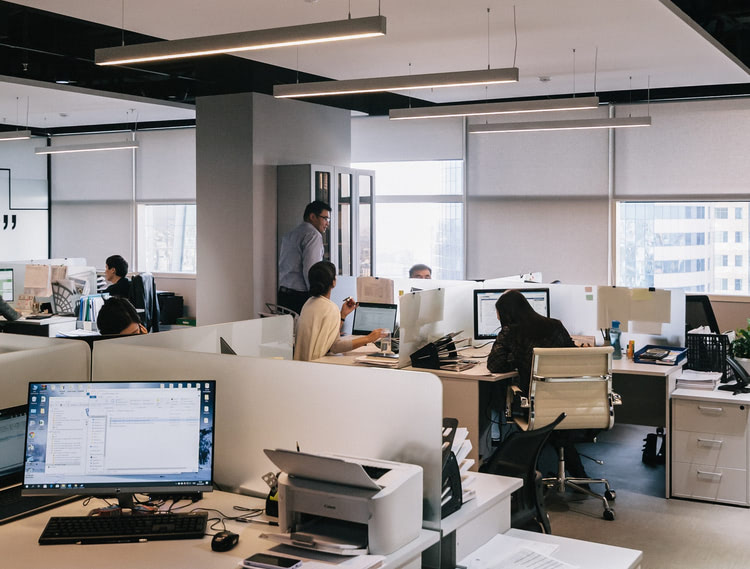Office Space: What 9 Changes Are We Likely To See for Businesses Post-Covid-19?

#FutureofWork – Business has had its fair share of turbulence over the years, but never in our wildest dreams could we have imagined a virus shutting the world down.
Whilst economic uncertainty has fuelled the growth of the flexible office sector in recent times, the ramifications of a pandemic may have created a whole new dimension to approaching the rental of an office.
In addition to financial and flexibility considerations, many organisations may also now focus on other factors including hygiene and disaster recovery in their next move.
Based on conversations Free Office Finder have had with many of their landlords and tenants in the last few weeks, here are 9 changes that they predict businesses will consider in the future of work:
1. Virtual Office Tours
In these unprecedented times, many office providers are creating virtual office tours for their office space. This involves 360° viewing technology which allows prospective tenants to immerse themselves with a virtual walkthrough of each room. In layman’s terms, the ability to view an office without leaving your chair. A company’s decision to take an office could now be a combination of some parties within the company viewing the space in person and others from a virtual tour.
2. Coworking (Hot-desks Switch to Fixed-desks)
Whilst most coworking spaces have a good daily cleaning process, it may not be enough to keep the interest of many solo workers. The idea of sitting at a desk that someone else has been sitting at 5 minutes previously, could prove too much for many after Covid-19. Many coworking spaces do offer fixed desks and we believe the fixed desk solution will start to replace the shared deskspace. We may start to see larger desks being used in both coworking and private offices to help maintain better social distancing.
3. Pre-agreed Rent Reductions for Lockdowns
The government is currently advising people to work from home in the face of a pandemic, meaning many companies are unable to safely occupy their offices. As a result, we may see ‘Pandemic clauses’ inserted into contracts to allow for either a pre-agreed free or reduced rent period during a time like this until the advice (or actual lockdown) is lifted. This could be placed within agreements that office providers have with their head landlords right the way down to the small business occupying the suite.
4. The End of Phone Handsets
With record numbers of people working from home, many companies have switched to virtual phone systems. This is typically cloud-based software that enables you to make and receive phone calls through your computer or mobile. Many virtual solutions offer the same functionality you receive in a top of the range business handset, such as call forwarding, ring groups, call recording and voicemail. The fallout from Covid-19 has highlighted the importance of a quick disaster recovery solution and a virtual phone system enables people to work from a remote location immediately if needed.
5. Flexible Space
Companies may seek office space within a building that provides the ability to downsize (or upsize) at short notice if a pandemic arose. A different size of office may also be needed during the recovery phase due to the inevitable change in the volume of business/staff it has. Many flexible office spaces include utilities and internet into the price, so it saves having to deal with multiple companies if there is a change in the requirement.
6. Frequent Communal Cleaning
Some offices provide daily cleaning services of communal areas such a kitchen, seating areas and toilets. Communal areas are usually well-kept; however, we expect to see an increase in the frequency of communal cleaning, possibly with a signature system as you would expect to see in the toilets of a pub, restaurant, hotel or shopping centre etc.
7. Higher Percentage of Remote Workers
If remote working proves successful, there may be an increase in people working from home, on either a part- or full-time basis, resulting in less office space required by businesses. With fewer members of staff working from the office, a business may be able to rent fewer desks than originally needed, saving money on the total workspace required.
One thing to bear in mind is that working in an office provides social interaction, helps to increase endorphins and may provide higher productivity, so remote working needs to be carefully considered in the overall picture as opposed to just the cost of a desk.
8. Increase in Virtual Meetings
With millions of people across the globe currently isolating, companies are being forced to hold virtual meetings using applications such as Zoom and Microsoft Teams. With virtual meetings becoming the new norm during the Coronavirus outbreak, employees and companies will become more comfortable with video conferencing technology and we could see a much higher percentage of virtual meetings going forwards. In addition, virtual meetings can save companies both time and money on travel and meeting room hire.
9. Less Desks, More Storage Space
When China went into lockdown, the supply of many electrical goods slowed down, increasing prices and making some electrical parts for computers un-obtainable. Additionally, cleaning supplies and other everyday goods went out of stock as people stockpiled. Whilst we don’t expect organisations to start building bunkers within their offices, we do think companies will want to take additional space to store essential items in good supply should a national or worldwide shortage occur again.











Responses